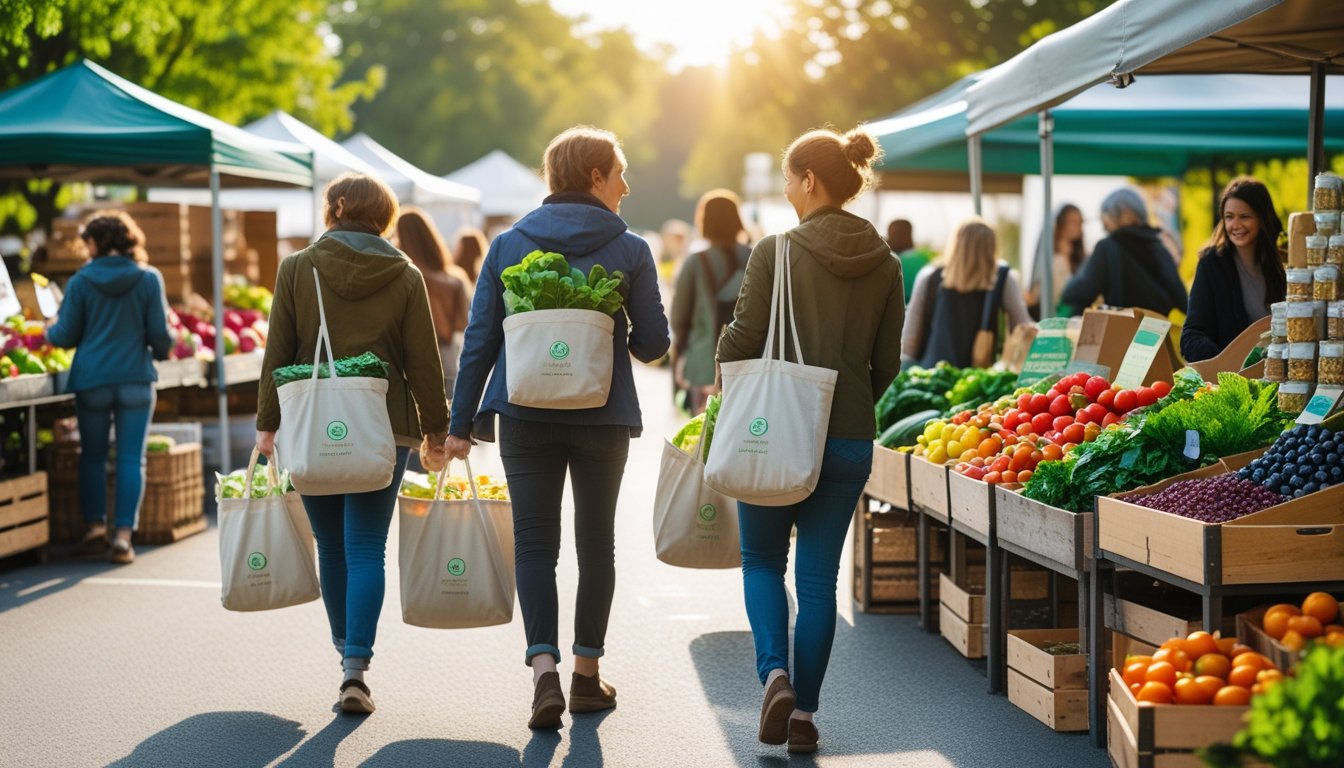Late updated: 13 Oct 2025 11:10
Written by: Sarah Hollister
Eco-Friendly Tips For Sustainable Shopping: A Comprehensive Guide
In an era where environmental consciousness is no longer a choice but a necessity, transforming our shopping habits can make a significant difference. Our daily purchasing decisions directly impact the planet. Adopting sustainable shopping practices not only helps reduce our carbon footprint but also supports brands dedicated to ethical and eco-friendly values.

As more consumers become aware of their environmental impact, the demand for sustainable products has risen. We're focusing on making smarter choices, from choosing products with minimal packaging to supporting companies that prioritise renewable and recycled materials. These conscious decisions contribute to a cleaner environment without compromising on quality or convenience.
By integrating practical eco-friendly tips into our routines, we can make informed choices that benefit both the environment and our budgets. The journey towards a more sustainable lifestyle begins with each of us contributing through small, mindful changes in our shopping habits.
Key Takeaways
- Sustainable shopping reduces environmental impact
- Ethical brands play a key role in eco-friendly purchasing
- Small changes in shopping can lead to significant benefits
Essential Eco-Friendly Tips For Sustainable Shopping

We can make a significant impact on reducing carbon emissions and excess waste by adopting sustainable shopping practices. By prioritising eco-friendly products and minimising overconsumption, we contribute to a healthier planet.
Choose Eco-Friendly and Certified Products
Selecting eco-friendly products involves considering materials and certifications that align with sustainable practices. Products made from organic cotton, bamboo, and recycled plastic offer lower environmental impacts compared to conventional options. Ethical certifications like Fair Trade ensure that workers are paid fairly and work in safe conditions. Additionally, choosing items with verified eco-labels helps us avoid greenwashing, a tactic where companies falsely claim to be more environmentally friendly than they are. It's essential to research brands thoroughly and prioritise those that are transparent about their sourcing and manufacturing processes. By choosing sustainably-produced goods, we support responsible consumption and reduce energy consumption, emphasising our commitment to lowering pollution and promoting climate change mitigation.
Bring Your Own Reusable Bags
Reusable bags are a simple yet effective way to cut down on single-use plastic waste that contributes to environmental pollution. They come in various materials, including organic cotton and recycled plastics, providing a sustainable alternative. Having a set of durable reusable shopping bags for different types of shopping like groceries or clothes ensures we always have eco-friendly options at hand. By using fabric bags that are easy to wash, we maintain hygiene without resorting to plastic options. In addition, we can encourage others by gifting reusable bags, promoting widespread adoption, and highlighting their role in decreasing our carbon footprint. Our consistent use of reusable bags signals to retailers and peers alike the value of sustainable consumption.
Avoid Overconsumption and Impulse Purchases
Overconsumption and impulse buying are significant barriers to sustainable shopping. It's important we deliberate on purchases carefully, focusing on need rather than desire. By planning our shopping trips and creating lists, we make intentional choices that align with our sustainability goals. Understanding the environmental impact and energy resources consumed in product manufacturing, we avoid items designed to be disposable or quickly replaced. Our focus should lean towards quality over quantity, opting for items designed to last. Adopting mindful buying habits reduces waste and supports a more sustainable lifestyle, ensuring our actions reflect our environmental commitments and paving the way for more responsible behaviour among peers.
Minimise Packaging Waste
Packaging waste, especially plastic packaging, is a major contributor to landfill overflow and ocean pollution. By choosing sustainable packaging options when available, such as recycled or compostable materials, we support brands prioritising environmental responsibility. Products with minimal packaging, like bulk items, further help in reducing waste. Bringing our own containers for loose goods at zero-waste stores is another step towards minimising packaging waste. We must also be vigilant about recycling packaging wherever possible, confirming what materials our local recycling centres accept. By taking these actions, our collective effort to minimise packaging waste significantly contributes to lowering the ecological damage and enhancing sustainable living practices.
Smart Shopping Choices For Lower Environmental Impact

Our purchasing decisions significantly affect the environment. By adopting thoughtful shopping habits, we can reduce waste, conserve resources, and support sustainable practices. Let's explore how choosing local businesses, opting for second-hand items, and making informed online purchases can contribute to a greener planet.
Shop Local and Support Small Businesses
Supporting local businesses is an impactful way to reduce our carbon footprint. When we shop locally, products travel shorter distances, reducing transportation emissions and fuel consumption. Additionally, local shops often carry unique, locally-produced goods, which sustain community talent and creativity.
Local farmers' markets present fresh and healthy produce that hasn’t been wrapped in excess packaging. This not only supports local farmers but also minimises single-use plastics. Our spending keeps money circulating in the local economy, which can have further beneficial social and environmental effects. It's a win-win for our neighbourhood and the planet.
Opt For Thrift and Second-Hand Stores
Second-hand shopping is a sustainable and economical choice. By purchasing used products, we contribute to a reduction in the demand for new items, which can significantly conserve resources and energy. Thrift stores offer a wide range of unique finds that have plenty of life left in them, from clothing to furniture and electronics.
This form of shopping extends the lifecycle of products, keeping them out of landfills, and reducing waste. Engaging in second-hand shopping also supports charitable organisations and small businesses. It's an eco-friendly way to enjoy shopping while being mindful of our environmental impact.
Make Informed Decisions When Shopping Online
Online shopping can be convenient, but it comes with its own eco-challenges. To minimise impact, we can choose retailers committed to sustainable practices. Look for companies that use eco-friendly packaging and efficient shipping methods. It's also crucial to consider the origins of products, ensuring they are made sustainably and ethically.
Before making a purchase, evaluate the necessity of the product and opt for items that are durable or made from recycled materials. Supporting ethical brands helps encourage more businesses to adopt green initiatives. We must be conscious of our online habits to align them with our environmental values.
Frequently Asked Questions

We often encounter several queries about sustainable shopping. Here, we address common concerns that can help enhance eco-friendly purchasing decisions.
What are the best ways to identify sustainable products while shopping?
Identifying sustainable products can be achieved by looking for eco-friendly certifications such as Fair Trade, USDA Organic, or Energy Star. These symbols indicate a commitment to ethical and environmentally responsible practices. Reading labels carefully and researching brands that prioritise sustainability can also guide our buying choices.
How can consumers verify the authenticity of eco-friendly labels?
Verifying the authenticity of eco-friendly labels requires investigating the certifying body behind the label. Recognised organisations like Fair Trade and Energy Star have strict guidelines and assessments. We can also check company websites for transparency around certification processes and look for consumer reviews that testify to the brand's environmental commitments.
In what ways can purchasing locally sourced products contribute to sustainability?
Locally sourced products typically have lower transportation emissions, as they do not need to travel long distances. This reduces our carbon footprint. Additionally, supporting local producers boosts regional economies and often ensures fresher products, which means less energy is used in preservation and storage.
What are the most effective strategies for reducing plastic waste during shopping?
Reducing plastic waste is achievable by carrying reusable bags, avoiding products with excessive packaging, and opting for items sold in bulk. We can favour brands offering package-free goods or those using biodegradable materials. Using reusable produce bags and containers can greatly diminish our plastic consumption.
How does choosing seasonal produce impact environmental sustainability?
Seasonal produce is usually grown without artificial heating or intense irrigation, making it more sustainable. It requires fewer resources and often travels shorter distances to reach us. Eating seasonally also supports local agriculture and biodiversity, as it relies on crops that thrive naturally in certain climates and times of year.
What should shoppers consider when choosing between organic and non-organic goods?
When choosing between organic and non-organic goods, we should consider factors such as environmental impact, nutritional value, and cost. Organic farming often uses fewer chemical pesticides and sustainable land practices. While organic goods can be more expensive, they may offer health benefits and reduce environmental harm compared to conventional alternatives.
